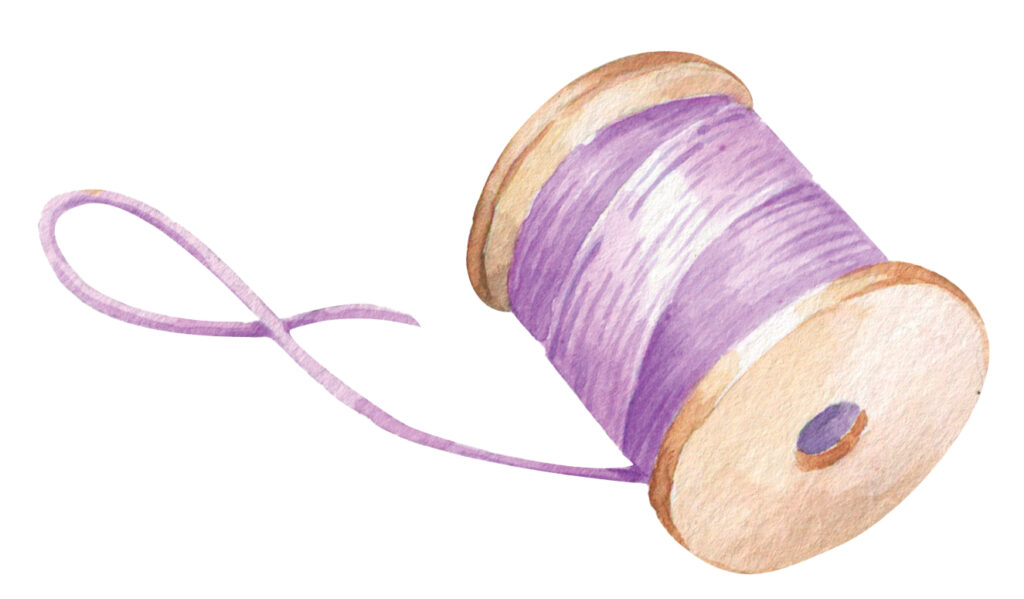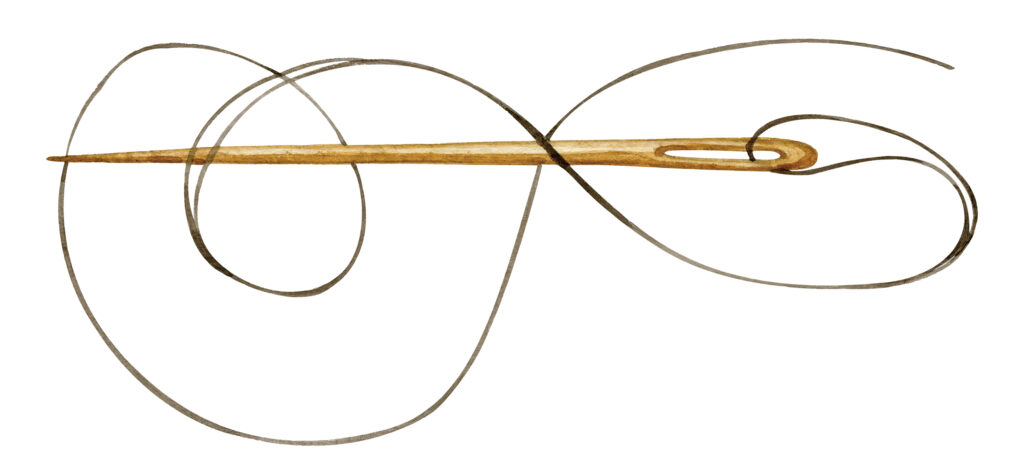In the Ninth Month of 1777, as General William Howe was advancing on Philadelphia, Crown and Continentals alike plundered the neighborhood of Valley Forge. They took food, livestock, and all manner of domestic goods, but they were concerned especially with witchwork, both armies being desperately short on witching thread.
That is how my friend Abigail Freeman and I came to be standing in the doorway of Valley Friends Meeting on the eighteenth of that month, mouths agape at the sight of the bare plank floor.
The soldiers had taken our carpets.
The witchwork embroidery in the cloth of Abigail’s cloak glittered as it repelled the rain, forming a halo about her thick, dark hair. She looked at me sideways from underneath it. “Didn’t the Walkers tell us that the Hessians were taking everything that wasn’t nailed down?”
I stepped inside and knocked back my hood, inspecting the puddles of mud tracked across the floor. Nothing of the weeks of work Abigail and I had done remained. “At least they left the floorboards.”
Footsteps echoed against the naked planks, hollow and ringing under the rain-pattered roof. My heart seized on the fear that the Hessians might still be in the meetinghouse.
Elizabeth Richardson, one of Valley Meeting’s elders, appeared in the doorway to the men’s half of the meeting. “Suzannah Morton! What brings thee out in this weather?”
“I could ask the same of thee,” I said, righting a fallen bench.
“The Halloways need a traveling minute.” Elizabeth’s petticoat was waterlogged at the hem—she was of the observant set that didn’t approve of witchwork. “The Patriots asked me to thank the meeting for our writing desk. Washington’s was damaged on the road from the Brandywine.”
“The Patriots?” Abigail asked. “The Hessians aren’t enough?”
“They came for their supplies at the forge,” Elizabeth said.
“They didn’t hurt thee?”
“No,” said Elizabeth, “but neither did they leave our papers.”
“What possible use could they have for your papers?” Abigail asked.
“I told thee both not to practice thy witchwork on our carpets,” Elizabeth said. “They would not have come all this way but for that.”
I ran my fingers over the dry witchwork stitches of my cloak. They didn’t glitter like Abigail’s—my concession to Quaker simplicity—but either army would have it off me, if they saw it. “They took it all back to the forge?”
“To the Potts mill.” Elizabeth gave me a shrewd glance. “Thee would do well to leave them be, Suzannah.”
Isaac Potts’s mill was on Valley Creek, below Mount Joy Forge—some three miles from the meetinghouse. If I hadn’t been so hot in my temper over the Patriots taking my witchwork, I would not have made the walk in any weather.
But we’d put in weeks of work on those carpets, Abigail and I. We’d invented entirely new stitches to hush footsteps and echo ministry across the room. Vain and foolish as it was, I couldn’t bear to let them unravel it all so easily. “If I’m to blame for them coming,” I said, “then it falls to me to retrieve our papers. I have no intention of courting trouble.”
Elizabeth snorted. “I’m afraid thee will find that when it comes to trouble, the Patriots are men of loose virtue: they need no courting at all.”

There was no question of Abigail coming with me on my fool of an errand. I was staking a great deal on faith that the thieves who were plundering the neighborhood would comport themselves as gentlemen toward me. But I was a Quaker woman of Welsh and Scottish stock. The only traces of Europe in Abigail’s veins had gotten there by the same sort of violence she had to fear from General Washington’s gang.
We parted ways at the end of the graveyard fence: she back to Tredyffrin with Elizabeth Richardson, and me across the hills toward the river.
“I’ll walk back by your way,” I told her, handing off my cloak.
“If you don’t,” Abigail said, “I’ll send the British to retrieve you.”
When the stitch was done, the result was instant: the wound began to knit together, repelling blood and mud. The bleeding slowed, stopped, and washed away, leaving nothing but clean, whole flesh underneath.
One of Washington’s dragoons met me on the hillside overlooking the mill. He took one look at my traveling habit, dry and unsoiled, and insisted on escorting me to his companions.
The mill and lower forge bustled with men, coming from the river with empty hands and leaving again with casks, munitions, and stolen property. Inside the mill, the meeting’s carpets were piled in rolls in the middle of the floor, conspicuously pristine among the flour-dusted hoard.
One run sat on top of a row of flour casks, a stretch of it unrolled beside our writing desk. Beside them, an auburn-haired officer with lean, angular features pored over our papers.
“Hamilton,” my escort greeted. “We have an envoy from the Quakers.”
Hamilton looked up.
By the time my escort had stepped away, Hamilton had taken in the clean, dry state of my traveling habit. “Do I have the honor of addressing . . .” he checked our minutes again, “Miss Suzannah Morton?”
“Thee does,” I said. Our elders had plenty to say about my habit of dropping plain speaking when I was not among Friends, but around foes at least I could wear it as armor.
He bobbed a courteous bow. “Alexander Hamilton. Your work is ingenious, madam. With some adaptation, I believe these stitches could silence muskets as well as footsteps.”
Something like dread scurried up my spine before spreading across my face, where I was certain he saw it as plainly as I felt it. It wasn’t enough they’d stolen from the meetinghouse; they meant to use the stitches Abigail and I had invented for war? “My work is not a weapon,” I said.
My words hung in the air between us like an icy breath, cold with horror.
Hamilton ran his fingers over the stitches, studying them. He knew enough of witchwork to have picked out the run where we’d laid the root stitches—the stalk from which the entire pattern grew. “Our witchworkers can unpick all these stitches and work them out that way, but you’d save them a great deal of time if you would tell us how you’ve done it.”
I couldn’t imagine where he’d come by the misapprehension that I wanted to save the Patriots time, but there seemed no sense in asking. Washington’s witchworkers could do what their conscience allowed. They would have no help from me.
“I don’t imagine the argument that a swift end to the war would save lives would sway you,” he said.
I shook my head, still staring. “I cannot help thee.”
“And I will not insult you by offering payment,” he said. “I’m afraid I cannot return these to your meeting.”
My mind raced. Is this what our work was to come to? One more bayonet in a war that drowned the countryside in blood and lawlessness? Was there nothing to prevent it?
My gaze fell to Hamilton’s hand on our writing desk. If the carpets were damned, I could at least honor my word to Elizabeth Richardson concerning why I had come. “Will thee at least permit me to retrieve our papers?”
“Your papers?” He looked down at the meeting minutes and ledger spread out before him. “Of course. You may take them with our thanks, Madam.”
He began to gather them up for me when someone called from the doorway, “Hamilton! Bear a hand with the scow!”
“Excuse me,” Hamilton said. “I trust you can see yourself out, Miss Morton.”
He did not wait for me to respond, but took the writing desk and bustled out of doors, leaving me alone in the mill.
I looked at our papers, neatly tucked into our ledger—and beside them, the root stitches of my greatest work. Abigail and I had conceived the pattern in the back of my aunt’s workshop, after Mary Reese lamented at losing the ears to hear God’s ministry: if witchwork could wick water, why not sound?
Silence came first: footsteps, coughs, the occasional snore—all could be hushed in the threads. To amplify a sound without trapping it—to carry it across the floor and up to waiting ears—took longer. We’d spent weeks designing the stitch before I brought the proposition to the meeting.
And now here it sat in a pile of plundered treasure, waiting to be hustled down the Schuylkill to quiet a Patriot’s musket.
I couldn’t hope to steal it back, with the mill crawling with Patriots. But the root stitches. Without them, there was nothing to copy: all the rest were simple repeating stitches. The root is what wicked in the sound from every run of carpet and held or echoed it back. God help me, I could not leave Abigail’s and my work for the Patriots to copy.
I pulled scissors out of my pocket and cut the witching thread.
The thunderclap that escaped the threads nearly deafened me.
I staggered backward, clutching my ears, as another echoed out, and another.
I’d cut the thread for silence. Without it, every footstep caught up in those stitches was escaping, swelling through the roll of carpet, which caught the sound and amplified it again, again, again, each one ricocheting through the threads until it boomed like musket fire.
As I hurried to cut the rest of the root and pulled the stitches free, Hamilton appeared in the doorway, ashen with shock. With eyes as wide as a frightened horse, he took in the sight of me standing over the carpet, scissors still in my hand. “What have you done?”
An echo of the booming carpet answered before I did—the sharp staccato of musket fire, from somewhere up the hill.
Hamilton glanced that way, then strode into the mill. “They’ve heard you.” He pulled his horn off his belt and began to load a musket. “You should run, Miss Morton.”
And run I did: I put up my scissors and bolted for the creek, holding my witchworked white handkerchief above my head as I went.

I might have imagined a musket ball flying past me before I jumped down the bank of the creek, but I did not stop to look: I slid down the muddy bank and into the rain-swelled stream.
When I found my footing and looked back, the Patriots were running for the river, where they had a scow piled with casks. Several had taken to horse, and were returning the British troops’ musket fire as they retreated to the ford.
Hamilton came behind them, the smoke of his musket thick about him as he mounted his horse amidst the rapid staccato of another volley.
He’d just rounded my side of the mill when he seized on his horse, then slumped. He tumbled senseless from his saddle, leaving a streak of red blood in his horse’s coat. The animal reared and ran, leaving Hamilton behind in the mud, not three paces from me.
I leaned against the stream bank, as still as the slick stones beneath my feet, and watched Hamilton’s breath come in labored gasps.
I had done this to him.
I had brought this violence over the hill. As surely as if I had fired the musket myself, I had left Hamilton bleeding in the mud.
The musket fire receded into the heavy rain. I pulled my gaze away from the stuttering rise and fall of Hamilton’s breast to find that his companions had succeeded at leading the British away.
I climbed the stream bank and knelt by Hamilton’s side. “Hamilton? Can you hear me?”
His face was as white as my handkerchief, gray with pain. If he reproached me, he was in no fit state to show it. I reached for his hand, and he gripped mine tightly. With his left, he pulled his bloody jacket away from his breast.
The mess the musket ball had made of his chest was clear to see: the ball itself protruded from the wound with his every labored breath. I watched in horror as his scratching fingers found the ball and pulled it free.
He gasped at the effort, then his head lolled back, and his hand went slack in mine. His breath was slow and shallow.
I pressed my handkerchief against his wound, trying to staunch the bleeding. It was worked for cleanliness and mending, but it could take up blood—it just wouldn’t keep it, when washed. But the blood of his wound kept coming. A handkerchief would not be enough.
“Stitch it, Miss Morton,” Hamilton’s voice was a pained whisper. “Please.”
I started to tell him it was no use: no one had ever witchworked living flesh, not in centuries of trying. But as I watched the root stitches of my handkerchief shine white against the red of his blood, I was struck by the memory of running repeating stitches from one run of carpet to the next, and Truth shone through me like a light through fog: flesh couldn’t hold root stitches, but I could still save him.
I pulled a spool of witching thread from my pocket. “This will hurt,” I told Hamilton, but he was too far out of his wits to hear me. He barely moaned as I worked a repeating stitch through the root stitches of my handkerchief and into the flesh beneath.
When the stitch was done, the result was instant: the wound began to knit together, repelling blood and mud. The bleeding slowed, stopped, and washed away, leaving nothing but clean, whole flesh underneath.
As I tucked my thread and scissors safely away, voices drifted through the gathering dusk.
I scrambled to stand between Hamilton and the sound, jealous of the miracle God had used my hands to work.
My traveling habit was Quaker-plain but still spotless and dry; God willing, it would be enough to draw the eye away from the muddy heap of a man at my back.
Round the mill came not a Hessian but a Black soldier, one of Howe’s loyalists. He saw me and put up his musket. “Suzannah Morton?”
“I—I’m afraid thee has the better of me,” I stammered.
“Miss Abigail Freeman suggested we might find Washington’s men harassing you here,” he said. “You’re safe now, Miss Morton. We’ve chased the Patriots away.”
From the mill, someone shouted with glee, “The rebels left us a fortune in witchwork!”
I walked his way, hoping to distract him from the man in the mud, but as we rounded the mill I looked back, and Hamilton was gone.
The next time I saw Hamilton was the twenty-sixth day of the Twelfth Month of that year. Washington had taken our meetinghouse for a hospital, and pallets of fevered soldiers had replaced our benches.
Abigail sat next to one of these with one of Washington’s witchworkers. “You need the pattern for cleanliness, too,” she said, looking over the stitches, “or the man will mend only to die of fever.” Abigail had been the one to discover that, when we were in Philadelphia teaching Howe’s witchworkers.
The door opened, and in walked Alexander Hamilton, hale and whole, on the heels of George Washington. At the sight of me, they made their way up the makeshift aisle.
I have been known in my time to disguise contempt as Quaker peculiarity, but for all Hamilton had done, I could bear him no ill will: in taking our stitches for silence, he had led me to Truth. Even Elizabeth Richardson acknowledged the godliness in witchwork that could mend the evils men dealt one another.
And so I set the stitches I was unpicking on the bare plank floor and rose to greet our guests.




1 thought on “Refuse All Their Colors”
Comments on Friendsjournal.org may be used in the Forum of the print magazine and may be edited for length and clarity.